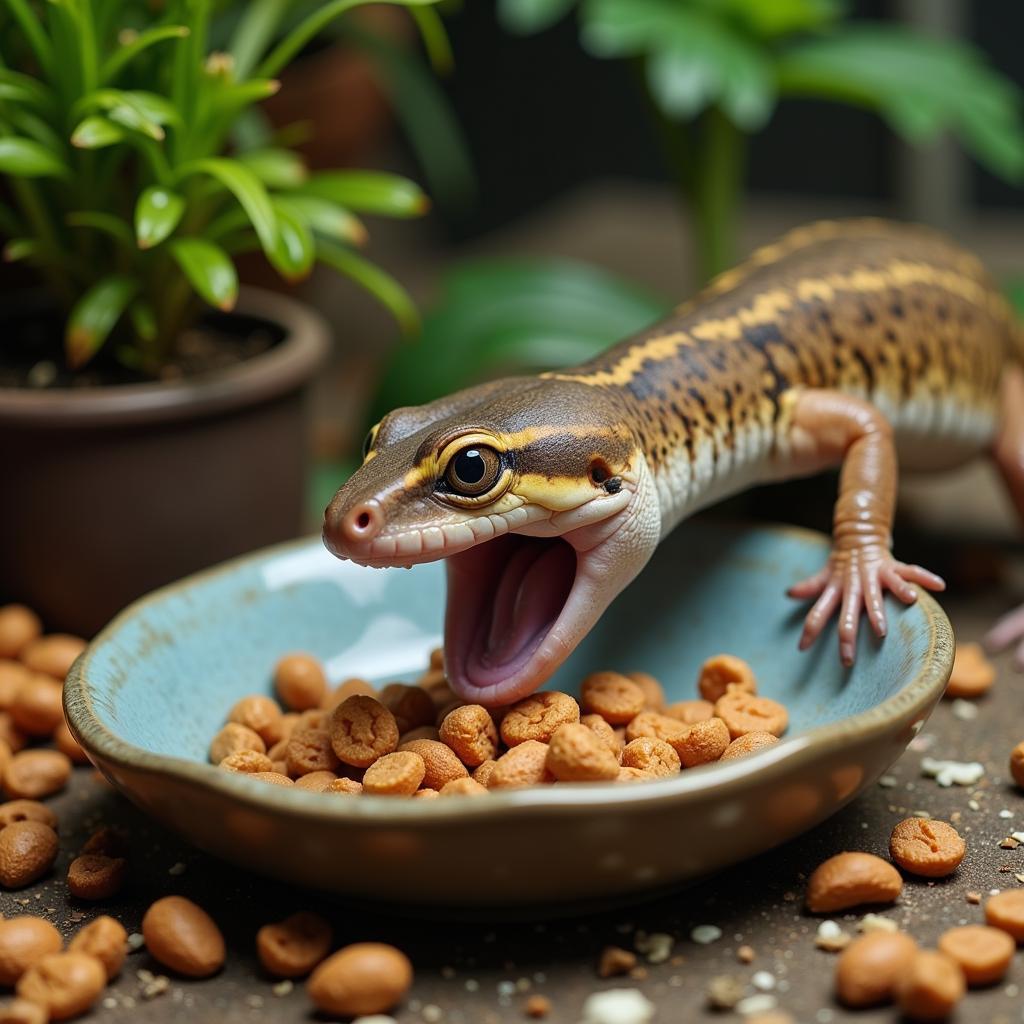Finding the best dog food for your blue tongue skink might seem counterintuitive. After all, they aren’t dogs! However, certain high-quality dog foods can be a valuable supplement to a bluey’s diet, offering a boost of protein and other essential nutrients. This guide will delve into the nuances of incorporating dog food into a blue tongue skink’s diet, addressing frequently asked questions and dispelling common misconceptions.
Why Consider Dog Food for a Blue Tongue Skink?
While a blue tongue skink’s primary diet should consist of insects, vegetables, and fruits, a small amount of high-quality dog food can offer several benefits. Dog food provides a concentrated source of protein, which is crucial for muscle development and overall health. It also often contains added vitamins and minerals, further enriching your skink’s nutritional intake. However, dog food should never be the primary food source for your blue tongue skink. Think of it as a supplemental treat, not a staple.
Choosing the Right Dog Food
Selecting the appropriate dog food for your blue tongue skink is paramount. Opt for high-quality, grain-free options with a high meat content. Avoid dog foods with artificial colors, flavors, or preservatives. Look for dog foods that list meat as the first ingredient, indicating a higher protein concentration. Puppies formulas are often recommended for their nutrient density.
 Blue Tongue Skink Eating Dog Food from a Bowl
Blue Tongue Skink Eating Dog Food from a Bowl
How Much Dog Food Should You Offer?
Moderation is key when offering dog food to your blue tongue skink. Too much dog food can lead to obesity and other health issues. A good rule of thumb is to offer dog food no more than once or twice a week, and only as a small portion of their overall diet. Remember, the bulk of their nutrition should come from insects, vegetables, and fruits.
Insects, Vegetables, and Fruits: The Cornerstones of a Bluey’s Diet
While dog food can be a beneficial supplement, the foundation of a healthy blue tongue skink diet rests on a varied mix of insects, vegetables, and fruits. Insects like crickets, mealworms, and dubia roaches provide essential protein and other nutrients. Dark leafy greens, such as collard greens and kale, are packed with vitamins and minerals. Fruits like berries and melon can be offered as occasional treats.
Creating a Balanced Diet
Balancing these various food groups is crucial for ensuring your blue tongue skink receives all the necessary nutrients. Aim for a diet that consists primarily of insects (around 60-70%), followed by vegetables (20-30%), and fruits (10-20%).
Common Mistakes to Avoid
One common mistake is overfeeding dog food. Remember, it’s a supplement, not a staple. Another mistake is offering low-quality dog food laden with fillers and artificial ingredients. Always prioritize high-quality, grain-free options.
“Overfeeding dog food can upset the delicate balance of a blue tongue skink’s digestive system,” explains Dr. Emily Carter, a renowned herpetologist. “Stick to a varied diet of insects, vegetables, and fruits for optimal health.”
Monitoring Your Skink’s Health
Regularly monitor your skink’s weight and overall health. If you notice any changes in appetite, behavior, or stool consistency, consult a veterinarian specializing in reptiles.
Conclusion
While the Best Dog Food For Blue Tongue Skinks can provide supplemental benefits, a balanced diet centered on insects, vegetables, and fruits is essential. By following the guidelines outlined in this article, you can ensure your blue tongue skink thrives and enjoys a long, healthy life.
FAQ
-
Can I feed my blue tongue skink dog food every day? No, dog food should be offered sparingly as a supplement, not a daily staple.
-
What type of dog food is best for blue tongue skinks? High-quality, grain-free dog food with a high meat content.
-
What are the main components of a blue tongue skink’s diet? Insects, vegetables, and fruits.
-
How often should I offer my blue tongue skink fruits? Fruits should be offered as occasional treats, not a significant portion of their diet.
-
Why is it important to monitor my skink’s weight? To ensure they maintain a healthy weight and avoid obesity.
-
What should I do if my skink’s appetite changes? Consult a veterinarian specializing in reptiles.
-
Can dog food replace insects in a blue tongue skink’s diet? No, insects are the primary source of protein and other essential nutrients.
More Questions? We’re Here to Help!
For personalized advice or further assistance, please don’t hesitate to contact us. Call us at 02437655121, email us at minacones@gmail.com, or visit us at 3PGH+8R9, ĐT70A, thôn Trung, Bắc Từ Liêm, Hà Nội, Việt Nam. Our dedicated customer service team is available 24/7.